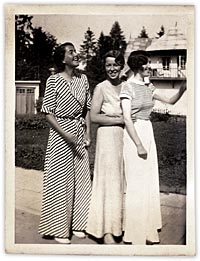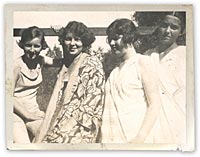 |
|
Felicja, Halina, and Aniela Lilpop
|
Last summer, my brother Charles and I sat in a darkened Warsaw screening room watching The Lilpop Sisters and Their Passions, a documentary about four beautiful and spirited Polish women who led remarkable lives at home and abroad until their deaths in the 1990s. The documentary, which screens here in November, reveals a vanished world: Warsaw between the two wars. But what made the film particularly revelatory was that it was about my family. My mother, Felicja, had been the second eldest sister.
The project began two years ago, when Polish filmmaker Bozena Garus-Hockuba contacted me in Chicago. I felt weird, wary-and flattered. A virtual stranger wanted to make a film about my family. Besides letters and photos stored at the family home in Oshkosh, which I had inherited, Garus-Hockuba absolutely needed archival footage that belonged to my cousin Richard Rodzinski, who runs the Van Cliburn International Piano Competition. My cousin is a busy man. But after a flurry of e-mails, he invited the Polish film crew and me to Lake Placid, where he fired up the old 16 mm projector.
 |
| Felicja with friends, including Karol Stryjenski (at left in photo) |
I knew the basic history: Our grandfather Franciszek Lilpop had been a prominent architect whose buildings in Warsaw survived the bombings because the Gestapo used them as residences. Born between 1904 and 1912, his four striking daughters had been part of Warsaw’s pre–World War II cultural scene-an artistic, musical, and literary mélange akin to those in New York and Paris. The eldest, Halina, married the volatile conductor Artur Rodzin-ski, whose career included post-war stints with the Chicago Symphony Orchestra and Lyric Opera. The others flourished in Europe, before fleeing the war. My mother, the artist, moved to Paris in 1935 with the promising young concert pianist Kazimierz Kranc. The third sister, Aniela, married and divorced a diplomat, then took up with Count Edward Raczynski, who, as Poland’s ambassador to Britain, had urged Churchill to honor the mutual assistance pact in 1939. The youngest, Marysia, married the talented, self-absorbed poet Zbigniew Unilowski, who died young and left her with a baby.
 |
|
The four sisters circa 1930
|
It’s easy to see your family simply as your family, not as individuals with complicated lives, loves, and secrets. We found a startlingly tender missive to my mother from her first true love, Karol Stryjenski, her professor, twice her age-and married. My brother Charles learned he’d been named after this man, not the composer Karol Szymanowski, our father’s friend. A comment in the movie, however, reinforced what we’d known all along: our father was the great love of our mother’s life, and of the four sisters, Fela had “the marriage made in heaven.”
The day of the screening, I walked out of the theatre with a deeper appreciation of their journey-and a generation’s journey from homeland to new world. And I felt entirely grateful to Garus-Hockuba, a former stranger.
| INFO The Lilpop Sisters and Their Passions (in Polish, with English subtitles) screens November 19th and 21st as part of the Polish Film Festival. Call 773-486-9612 for tickets. |
Photography: courtesy of Magda Krance


